|
Welcome to A&A. There are 14 full reviews in this issue. Click on an artist to jump to the review, or simply scroll through the list. If you want information on any particular release, check out the Label info page. All reviews are written by Jon Worley unless otherwise noted. If you have any problems, criticisms or suggestions, drop me a line.
|
|
|
A&A #250 reviews (February 2004)
������������������������������������� 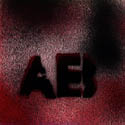 Alcian Blue
Alcian BlueTranslucent EP (self-released) I'm sure the guys are tired of hearing it, but boy, does this stuff remind me of Loveless. I've noticed how the distortion-drenched sound has been coming back lately, and I'm always amazed at how few people actually got the point: If you're gonna virtually destroy your songs, they'd better be pretty damned good in the first place. Trickery will not make a bad song good. Alcian Blue writes good songs. And then it takes the pieces, runs them through a barrage of blenders and emerges with squalls of noise punctuated by the occasional moment of clarity. Precisely on point, of course. I do wish the folks would work a little harder to define their own sound--the final product could be called derivative, though I wouldn't say that--but the four tunes here are exhilarating rides through the turbulent ether. Quite fine.
Contact:
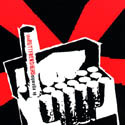 The Buttfrenchers The ButtfrenchersCigarette 7" EP (R Styles) In most ways (okay, in about every way), the Buttfrenchers are a generic garage band. They do have an infectious energy, and they know how to write a decent, punchy song or three, but there's nothing particularly great here. Except for the fact that this is on a slab of vinyl. I can't explain it, but that makes all the difference in the world. The medium doesn't improve the music, but it does measurably kick up the vibe. All of a sudden, this stuff feels oh-so-real. Anyway, the Buttfrenchers do sound cooler when their music rolls off a turntable. There's no rational reason for it, but then, music criticism isn't a purely rational act. Emotions factor in strongly, and my personal investment in the future of the turntable made average music sound great. Shoot me or something.
Contact:
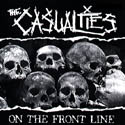 The
Casualties The
CasualtiesOn the Front Line (SideOneDummy) Political punk is back with a vengeance, and the Casualties seem to be saying, "Yer damned right!" This album starts off blistering and then just ratchets up the pressure. There's little subtlety to be found, and that's most appropriate. We hardly live in subtle times. The songs themselves are breakneck mini-apocalypses, with speed and riffage far outweighing melody and structure. That's cool, though. The energy is simply overwhelming. The production is professional--and that's also a good thing. With songs this fast and loud, it helps to be able to tell the guitar from the bass. But the songs don't come off with some preprocessed shine; they simply sound good. The Casualties don't play complicated songs. They don't sing about moral quandaries. The vision presented here is black and white, noise or silence. Sometimes, that's exactly what we need.
Contact:
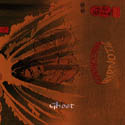 Ghost GhostHypnotic Underworld (Drag City) The members of Ghost are more artists than musicians. Yes, they play music (most of the time, anyway), but that music is being played to elicit a certain effect. I happen to find this approach cool and interesting, but I'm saying this right up front so as to make sure everyone knows what the hell I'm talking about. Which would make one of us, because Ghost doesn't exactly travel in a the real world. There are ethereal moments that are right out of Dead Can Dance, and there are shocking incidents of sonic violence. Then things get weird. Want to know how odd this gets? Ghost recasts Syd Barrett's lyrics to "Dominoes" with new music. And this new setting is even more disconcerting, even though it has many echoes of the original. In all, a typical Drag City release. Adventurous music for those who are willing to hike the back trails. The journey is most worthwhile; Ghost holds many jewels within its cape. Just don't give up before the end.
Contact:
������������������������������������� 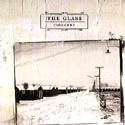 The Glass The GlassConcorde (Makeshift Music) So if the post-rock revolution went and invaded the prog-folk scene, well, the Glass would probably rise up from the ashes of the battlefield. These guys remind me of nothing less than the bastard child of 16 Horsepower and June of 44. And that ain't bad at all. There are plenty of references to "old school" alt. country, especially Brad Bailey's vocals, which sounds a bit like a mixture of Gary Louris and Jay Farrar. There's a tender fragility to his singing that is immediately arresting. But the music is the star. This stuff is well-conceived and highly crafted. The Glass didn't just waltz into some studio and thrash out an album. This puppy was baked with care. But it's not overdone. There are enough raw notes to convey plenty of emotion. A tough balance, but one that the Glass succeeds in creating. For such a tight album, this puppy sure does swing. The Glass contains both accomplished songwriters and players, and the result here is a transcendent album. Most impressive.
Contact:
������������������������������������� 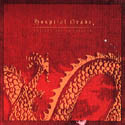 Hospital Grade Hospital GradeWritten Axe to Trigger (Urinine) I suppose that Hospital Grade falls into the whole emo category--that is, if you can remember when bands like Jawbox and Treepeople and Superchunk were considered seminal influences. This is conceptual rock with a punk edge. Kinda like if moderately-melodic punk music smashed into that whole post-rock thing. Built to Spill also comes to mind (though, of course, I did already mention Treepeople), but only the punchier stuff. Hospital Grade always keeps a sharp edge on these songs. There's nothing soft or round about them. Always a knife scraping across a blackboard. Keeps you awake. These are songs that make sense the fifth or fiftieth time you hear them. It's not that they're impossibly complex or anything, it's just such an unusual sound that it takes a while for your ears to adjust fully. But once they do... That's right. Total bliss. Put in the effort, and ye shall be rewarded. Or something like that. Hospital Grade is, indeed, of the finest quality.
Contact:
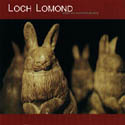 Loch
Lomond Loch
LomondWhen We Were Mountains (In Music We Trust) The vocal warblings are very Shins-y, but the music is decidedly more out there. Loch Lomond plays with beats, samples, loops, and more traditional sounds. Sometimes it's a band, and sometimes the pieces sound much more like a one-man project. But Loch Lomond is more a collective than a functioning outfit. Well, sort of. Richie Young and Rob Oberdorfer started work on this album, and in the end a good chunk of the Portland music scene stopped by to add one thing or another. Then Young officially joined the Standard, which picked up stakes and moved to my neck of the woods down here in the New South. You don't need to know all that to like the album, however. Yeah, a lot of these pieces are a trip--that's a good thing. Apparently Young, Oberdorfer and Kate O'Brien and Ryan Cross of Iretsu actually learned how to play these songs live and did a few club gigs. That's probably not happening again any time soon. But there is this album, see. And it's really good. The sort of album that takes creativity and then gets creative. Okay, so that sounds stupid, but you know what I mean. There are so many layers to these songs that it's impossible to peel them away in the short amount of time I have to review the disc. So I'll just have to play this one again a few hundred times.
Contact:
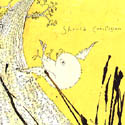 Brandon Patton Brandon PattonShould Confusion (self-released) Patton has that "breathy vocals floating above neo-folk" sound down, even though Patton's conception of neo-folk is much more Beck than, say, Fairport Convention. And Patton isn't against letting loose and rocking out every now and again. I like those louder moments best. That's when Patton sounds most at ease and where he also finds a space he can call his own. Which is not to say that the folkier stuff sucks; it doesn't. In fact, it compares well to Nick Drake and his ilk. But it's been done, and I just keep hearing dead people. The production is impressive, making this album sound a lot fuller than your average one-man effort. Yeah, Patton has some help, but he does most of the heavy work here. Not that you could tell from the sound. Just a nice, comfy set of songs. Patton refuses to tie himself to any one sound or idea, and I like that sense of adventure. That he generally succeeds is even more impressive.
Contact:
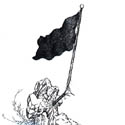 psi psiBlack American Flag (Evolving Ear) Two lengthy outbursts from these boys. Jaime Fenelly, Chris Forsyth and Fritz Welch make up psi, and it seems all three save some of their strangest and most intense ideas for this project. Electronic noise, guitar and percussion are the base, and the ideas flow from there. As anyone who is familiar with these guys knows, this is hardly music for the casual listener. psi demands attention. It challenges and probes in an attempt to redefine the nature of music itself. Okay, so maybe that's going a bit too far. Still, this is the sort of stuff that could sterilize cockroaches from 50 yards, so neophytes beware. Some serious experimentation is going on. It's been a while since my prefrontal lobes have had a workout this nice. Tap in and ride the wire. You won't be bored. Contact:
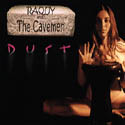 Raquy and the
Cavemen Raquy and the
CavemenDust (self-released) Raqui Danziger plays middle-eastern drums and bowed instruments. Most often she plays the dumbek (which is also known as the tabla, among other names), but she's more than proficient on a bewildering array of pieces. Her husband, Liron Peled, is her main collaborator (he most often plays guitars or a Moog that is specially set up to play "in-between" western notes). Together, they play traditional songs, stuff from modern masters and their own compositions. It isn't that easy to figure out which is which just by listening--proof that they know what they're doing. There's a palpable intensity to these songs, but also a delightful playfulness, which keeps everything on an even keel. There's no use playing music if you can't have fun with it. Same goes for listening. I know jack about this kind of music, but I like what I hear. Raquy has a fine sense of adventure, and these pieces are well-arranged and played. This disc makes it easy to step into another world.
Contact:
 Rasputina RasputinaFrustration Plantation (Instrinct) Years and years ago, a good friend of mine tried to turn me on to Rasputina. "You'll dig them, Jon. They...well, I can't tell you what they sound like, but there's these two women singing and then cellos start playing." It's likely my friend didn't use the word "women," but otherwise that's pretty much verbatim. But as I am pretty much overwhelmed by what arrives in my mailbox, I never searched out Rasputina. Turns out my friend was pretty dead on. It's difficult to describe exactly what Rasputina sounds like, though with the female vocals and cellos, well, there is a certain goth vibe. Goth as in Love and Rockets, I guess. In fact, I think that's about the best touchpoint I can come up with, though the two outfits don't sound a whit like each other. Except for their willingness to be very loud or very soft at any given moment. The songs themselves are quite conventional in construction, but the requisite cello arrangements (generally augmented by more traditional rock instrumentation) often turn the songs on their heads. And that's what so cool. Perhaps the centerpiece here is "If Your Kisses Can't Hold the Man You Love," a loopy song filled with asides and non-sequiturs. Somehow it all holds together, until it peters out at the end. This odd sense of anti-climax and general disdain for pandering to the audience has earned Rasputina a devoted (if small) following. This album should more than satisfy the devotees, and might even prick up the ears of a new novices.
Contact:
������������������������������ ������������������������������������� 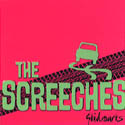 The Screeches
The ScreechesSkidmarks (Britsh Medical Records) New name (formerly the Leeches), new singer, same old sound. Somewhere in the dingy new wave-meets-rockabilly world of the Cramps, or, as the band itself seems to like, Blondie meets the Cramps. That's not a bad comparison, actually. The songs are nice and sleazy, but there's an underlying cohesion that keeps the songs inexorably rolling forward. This does sometimes give the impression that you've heard a particular song before--but I was having such a good time I barely noticed. The formula is simple: Husky female vocals, a tight rhythms section and a couple doses of spooky guitar. The songs aren't jokey--like, say, Deadbolt--but the music sometimes is. That's cool. Keep things loose, man. This is the second album from these folks that I've reviewed, and I still can't quite explain why I like what I hear. There's just a vibe running through this stuff that tickles my fancy. Maybe it's the strangely slavish devotion to the understated hook. Or maybe I'm thinking too much. Better get back to the fun and forget all this silly analysis.
Contact:
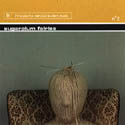 Sugarplum Fairies Sugarplum FairiesIntrospective Raincoat Student Music (self-released) Sylvia Ryder and Ben Bohm are Sugarplum Fairies, Ryder is a willowy blonde who does the singing, and Bohm focuses on everything that's behind her. Sounds a bit like Luna, eh? Yeah, it does. But in a good way. And anyway, there are differences. For one, Bohm never takes the front mike (and doesn't sing much in the background, either). Also, as Bohm runs essentially a one-man band, the music is a bit less lush and dreamy. There are sharp edges from time to time. One shared characteristic is solid songwriting. If you want to succeed in the whole soft-pop genre, you'd better have a serious wit and some real musical chops. Both are on full display here. Ryder and Bohm fill this disc with perceptive lyrics and music. Yeah, I'd advise them to work a bit harder on a more unique sound. But this album is a fine example of the form. Sugarplum Fairies have plenty of skill. Now they have to go out and make something of themselves.
Contact:
������������������������������ ������������������������������������� 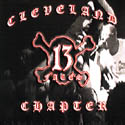 13 Faces
13 FacesThese Bloody Hands (Bandaloop) Just some Cleveland boys who like to kick out a little extreme hardcore. And the way these guys play, they can kick out as much as they damn well please. These guys play songs with more than one tempo. I know, that's not exactly revolutionary, but it does reduce the faceless factor. More importantly, 13 Faces realizes that this sort of music is all about the riffage. If the rhythm section is good, then the rest will follow. And the riffs are tight and tasty. The sound is just fuzzy enough to impart a definite taste of doom, but still sharp enough to leave a vicious bite. As for the playing, well, it's intense enough to keep this album rolling along at a fair clip. Nothing complicated or revolutionary. Just solid loud music. 13 Faces probably won't set the world on fire, but with music like this, it will make more than a few people very happy.
Contact:
Paul Alves Sousalves EP (Messin'
With Records)
Arms of Kismet Eponymous (Wampus Multimedia)
Bipolaroid Transparent Make-Believe (self-released)
The Boxing Lesson Radiation (Send Me Your Head Records)
Chubby Is It Time? (Gigantic Music)
Descendents 'Merican (Fat Wreck Chords)
Endgames Daybreak to Sunset (self-released)
Harris New Morning Pulse. EP (Urinine)
The Lot Six Major Fables (Tarantulas Records)
Sarah Rabdau Benevolent Apollo (self-released)
The Speeds The Speeds EP (self-released)
Various Artists Makeshift #3 (Makeshift Records) ������������������������������������� |
|
return to A&A home page